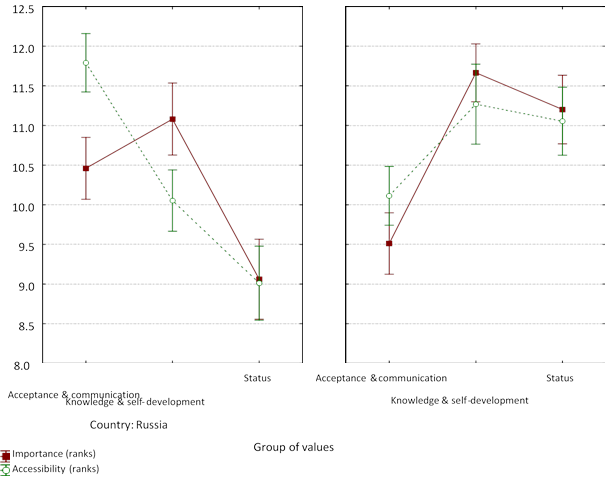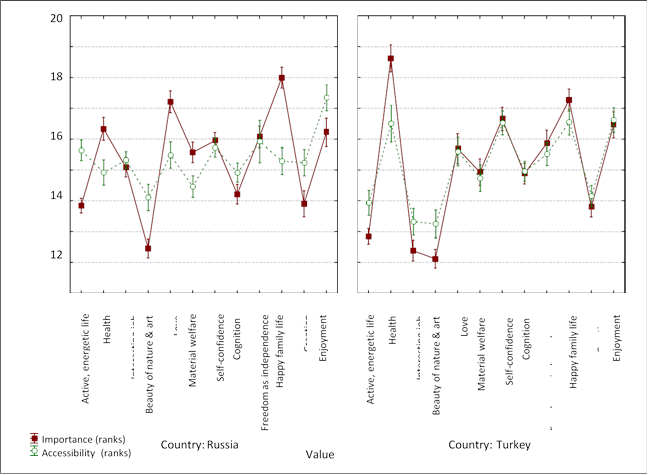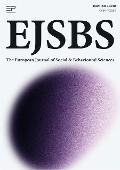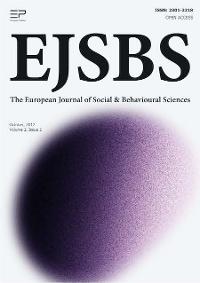Abstract
A comparative study of preferential features of general values and the values of educational activities of the 9-11th form students (15/16 years old) in Russia and Turkey. Preferences of Russian and Turkish 9-11th form schoolchildren were revealed and compared in relation to the basic and educational values (considering the correlation of significance and accessibility). It has been shown, that for Turkish schoolchildren the status values are considerably higher, than the values of acceptance and communication, whereas for Russian schoolchildren the regularity is opposite, which does not depend on neither sex, nor the school class. As to proper educational values of knowledge and self-development, no special differences have been detected. Besides, cultural and gender peculiarities have been revealed in significance and accessibility of such basic values, as health, happy family life and an interesting job.
Keywords: Value orientations, personality, senior schoolchildren
Introduction
Specific character of value orientations, priorities of some values in culture, in many respects determines socio-cultural and socio-dynamic processes and conditions of development of the society and the country. Relations between various values on the cultural level reflect the social dynamics of a conflict and agreement, which appear as the result of the aspiration of social groups and institutions for proper targets (Lebedeva, 2000). In a modern world all countries are interconnected, especially economically, so the science and culture of the entire world change under the effect of economically most developed countries. Turkey is one of those few counties, which manage to employ the social achievements of a highly developed Western society, democracy, and at the same time to preserve useful family, spiritual values and wisdom of the East, and, in particular, of the Moslem religion. Russia is a multinational, multicultural state, in which the Orthodox Christian traditions and values long since get on with the Eastern traditions and the Moslem religion, and numerous ethnic groups, which live in its territory, have a long- term historical experience of a peaceful co-existence. However, in Russia too the complicated social and economical conditions of re-orientation of public conscience for the last twenty years, connected with a transformation of the society, exert influence on the dynamics of development of the value orientations. In all countries, an alteration of the social situation of development leads to a change of significant vital parameters, ways of satisfaction of the needs and of realization of the basic values. Hence, appearance of new value orientations and an alteration of the former value hierarchy are possible. But, considering the globalization processes, one can assume an increase of the cultural closeness and the likeness of values and vectors of their alteration, even in originally different cultures. In this connection, a considerable interest is caused by a comparative study of changes of value orientations of a personality, as illustrated by different cultures. This study will also allow advancing considerably in a search of cultural universals, connected with a research of the values of a personality (Matsumoto, 1996).
Value orientations refer to the most complicated social-and-psychological personality formations, which exert a considerable influence on all sides of a human life. Formation of value orientations, as known, most intensely happens in senior school age, – the stage, significant for the formation of the ideology, search of the purport of life, self-determination. It is with this period of ontogenesis, that the level of development of value orientations is connected, which provides their functioning as a special system, which exerts a determining influence on the direction of the personality, its active social position. The process of formation of the value orientation system is stimulated by a considerable extension of communication, collision with a variety of forms of behavior, views, ideals. Therefore, a comparative research of value orientations of Russian and Turkish schoolchildren of this particular age will permit to describe more completely the specifics and a trend of development of the analyzed cultures.
The purpose of the research was to reveal specific preferences of general values and of the values of educational activities by schoolchildren of the 9-11th forms in Russia and in Turkey.
Methodology
Participants
A comparative research was conducted with schoolchildren of the 9 – 11th forms for the period from 2008 through 2011:
1) in Russia (Moscow) total 173 reports, of which 61 reports provided by boys (41 off – 9th form & 20 off – 11th form), while 112 reports provided by girls (62 off – 9th form & 50 off – 11th form);
2) in Turkey (Mersin – 33%, Istanbul – 60% & Ankara – 7%), total 149 reports, of which 73 reports provided by boys (58 off – 9th form & 15 off – 11th form), while 76 – by girls (42 off – 9th form, 34 off – 11th form).
Procedure
At each interrogatory, a pupil first fulfilled ranking of 22 values by means of their comparison in pair from the point of view of their significance for him («value» parameter), and then ranked the same values, fulfilling the selection in pair of the values, which, in his opinion, can be more easily achieved in future («accessibility» parameter), in conformity with the method by Fantalova (1992) and Mukhamatulina & Obidnaya (1997). Besides, it is important to note, that in cases, when the rank of significance of a certain value considerably exceeds the rank of its accessibility in future, there is a psychological conflict, which is indicative of his internal discontent, but at the same time, of the stimulating meaning-forming power of the value, trends of the motivation development. While in the case, when the rank of the value’s accessibility exceeds its importance, one can speak of a presence of internal vacuum, which shows «satiety», dying away of an incentive in the sphere. Coincidence of ranks of importance and accessibility are indicative of coordination of personal orientations. There was used a set of 22 values: ten values of school life and twelve general values (partially, the set included terminal values of М. Rokich’s methods). For better clearness, the results of ranking of the school life values were combined in three groups: values of knowledge and self-development («self-perfection in studies», «deep and solid knowledge» and «successful studies»); values of acceptance and communication («presence of good and loyal friends», «interesting conversation», «acknowledgement in a collective body», «approval by associates»); status values («my authority», «to be better than others» and «overcoming difficulties»).
Results
The received data allowed conducting a comparison, both as a whole between schoolchildren of Russia and Turkey, and differentially, considering the sex and the school class. In figure 1, a general picture of ranking of the school life values is represented. One can see, that the values of Russian schoolchildren considerably differ from those of Turkish schoolchildren, both as to the group of status values and to the importance and accessibility, though with both schoolchildren the importance and accessibility of those values are well coordinated (coincide in ranks), which means the absence of conflicts and a vacuum in the field. As to the group of values of acceptance and communication, one can see a considerable gap from the point of view of their availability: Turkish schoolchildren evaluate those values as less achievable, but also as less significant, as compared with Russian schoolchildren, though for both there is an expressed vacuum in the sphere of those values, and for Russian schoolchildren it is expressed stronger. In the group of the “knowledge” and “self-development” values, one can see a more similar picture, though for Turkish schoolchildren such values are somewhat more important and accessible (as well as more coordinated), though for both there is an expressed internal motivation conflict, which characterizes all-age and social (school education) factors.

As shown by the data analysis, separately for boys and girls, such general picture of differences is determined mainly by girls: for Turkish girls the status values are considerably more important and accessible, both in comparison with Russian girls, and as compared with Russian and Turkish boys. Besides, the values of acceptance and communication are more
accessible (and somewhat more important) for Russian girls, than for Turkish girls. Similar, but a weaker tendency is observed also for Russian boys, as compared with Turkish boys. The importance and accessibility of values of knowledge and self-development, both in Russia, and in Turkey are considerably higher for girls, than for boys.
The analysis of results of ranking per forms (and, correspondingly, age) of schoolchildren has shown, that particular features of value orientations of Russian schoolchildren, as compared with Turkish schoolchildren, previously described as to combined data, are revealed as early, as in the 9th form, while by the 11th form they are preserved and even become stronger. Thus, values of acceptance and communication lose their importance (accessibility also goes down) for Turkish schoolchildren, while for Russian schoolchildren the accessibility of such values rises, besides, the gap with the value increases, i.е. vacuum goes up. This is indicative of tendencies of development of value orientations in cultures of Russia and Turkey.
Figure 2 there shows the data of ranking of general values. One can see, that there are considerable differences in importance and accessibility of such values, as «love», «happy family life» and «material welfare». For Russian schoolchildren they are more important, but less accessible (which means an expressed conflict), whereas for Turkish schoolchildren they are a little less important and well coordinated. Such picture is observed both for boys and for girls separately, as well as in the 9th and the 11th forms, though for Turkish schoolchildren a small conflict is detected in the 9th form, which disappears by the 11th form. As to the «enjoyment» value, also one can observe a high coordination for Turkish schoolchildren (and its importance increases from the 9th to the 11th form, and is higher for girls, than for boys), while for Russian schoolchildren a vacuum is detected at a higher accessibility of the value, which grows from the 9th to the 11th form for the account of reduction of its importance (both for girls, and for boys). The «self-confidence» value for everybody is highly coordinated (both for sex, and for age), though for Turkish schoolchildren its importance is somewhat higher, than for Russian schoolchildren.

A considerable difference between the Turkish and Russian schoolchildren is observed as to the «health» value, – for Turkish schoolchildren it is more important with a higher internal conflict (it is stronger manifested for girls and does not change from the 9th to the 11th form). It is important to note a difference concerning the «interesting job» value, which is also, irrespective of a sex or age, considerably more important and more coordinated for Russian schoolchildren, as compared with Turkish schoolchildren (whose vacuum is pronounced for that value). The «interesting job» value for Russian schoolchildren acquires its topicality as early as in the 9th form, and then by the 11th form it somewhat reduces. This can be explained by the fact, that already in the 9th form they start to understand, that it is necessary to conduct in future an independent mode of life, which considerably increases the topicality of the professional self- determination problem (Mukhatuline & Obidnaya, 1997). Turkish schoolchildren also manifest a reduction of such value from the 9th to the 11th form, but with all that for them it is considerably less important (with a vacuum), than for Russian schoolchildren. One can suggest, that the attitude to that value is determined by its perception as means of self-realization: Russian schoolchildren see in it the way for the future self-realization, while Turkish schoolchildren connect possibilities of their self-realization with other values, – health and self-confidence. Perhaps, it can be explained by the fact, that their future as to work and independent life is more predetermined by their trend to «Autonomy» according to Schwartz (1992; 1994), i.е. by relying, in the first run, on themselves and on their own possibilities. This is confirmed by a greater importance of the «self-confidence» and «health» values, greater coordination in the «material welfare» value. This is also clearly manifested in the system of values of the school life, – for Turkish schoolchildren, unlike Russian schoolchildren, there are considerably more important status values and less important the values of acceptance and communication.
The «creation» value is similarly of low importance for schoolchildren of both countries, though for Russian schoolchildren the vacuum is pronounced, whereas for Turkish schoolchildren that value is well coordinated. This proportion does not depend on the school class or on sex, though an opposite tendency is revealed: for Turkish boys «creation» is more important, than for girls, and in Russia it is vice versa, - boys evaluate it higher than girls. As to the «freedom as independence in deeds and actions» and «beauty of nature and art», «cognition» values, Russian and Turkish schoolchildren do not differ either, evaluations are stable to a form (age) and sex. With all that, the value of «freedom as independence in deeds and acts» is well coordinated, while there is a vacuum as to the «beauty of nature and art» value.
Conclusion
It was revealed that for Turkish schoolchildren status values are considerably higher («my authority», «to be better than others» and «overcoming difficulties»), than the values of acceptance and communication («presence of good and loyal friends», «interesting conversation», «acknowledgement in a collective body», «approval of associates»), while for Russian schoolchildren one can observe just an opposite regularity; such relations do not depend neither on sex, nor on a school class.
As to proper educational values of knowledge and self-development («self-perfection in studies», «deep and solid knowledge» and «successful studies»), no special differences between Turkish and Russian schoolchildren have been detected.
There are revealed cultural and gender features for Russian and Turkish schoolchildren in importance and accessibility of such basic values, as health, happy family life and an interesting job.
Acknowledgements
The authors declare that there is no conflict of interest.
References
Lebedeva, N. М. (2000). Basic values of the Russians at the boundary of the 21st century. Psychologic magazine, 21(3), 73-87.
Lebedeva, N. М. (2008). Values of culture, economic directions and attitude towards innovations in Russia. Psychology. Magazine of Higher school of economics, 5(2), 70-87.
Matsumoto, D. (1996). Culture and psychology. Pacific Grove (Cal.)
Mukhamatulina, Е. А., & Obidnaya, S. N. (1997). Problem of social adaptation of teenagers in the process of construction of life perspective & evaluation of proper subjective possibilities. In S. V. Krivtsova (Ed.), Teenager at the cross-road of epochs (pp. 18-52). Moscow: Genesis.
Fantalova, Е. B. (1992). About a methodic approach to research of motivation and internal conflicts (on the contingent of arterial hypertension patients and healthy people). Psychological magazine, 13(1), 107-116.
Schwartz, S. H. (1994). Are there universal aspects in the structure and contents of human values? Journal of Social Issues, 50, 19-45.
Schwartz, S. H. (1992). Universals in the content and structure of values: Theoretical advances and empirical test in 20 countries. In M. P. Zanna (Ed.), Advances in Experimental Social Psycology. – V. 25. – Orlando, FL: Academic.
Copyright information

This work is licensed under a Creative Commons Attribution-NonCommercial-NoDerivatives 4.0 International License.


